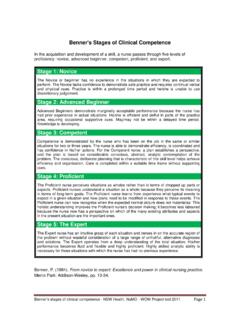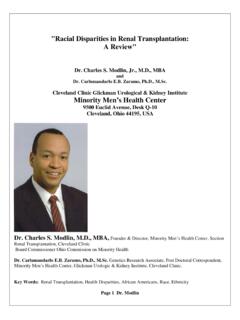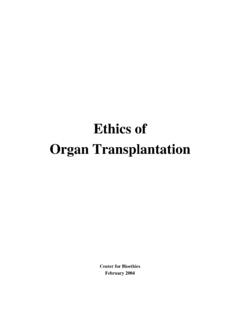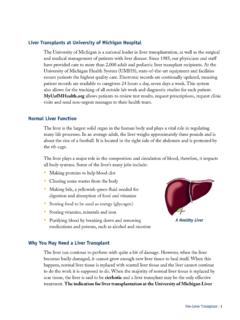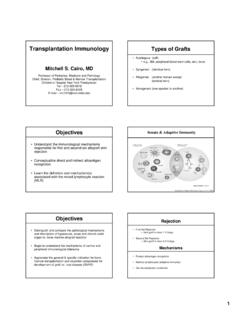Transcription of Organ Transplantation - nyp.org
1 A National Leader in Organ TransplantationNewYork-Presbyterian Organ TransplantationTable of ContentsIntroduction ..1 Heart Transplant ..3 Lung Transplant ..5 Liver Transplant ..7 Kidney Transplant ..8 Pancreas .. Donation ..13A NATIONAL LEADER IN Organ Transplantation I I 1A National Leader in Organ TransplantationNewYork-Presbyterian is a national leader in the Transplantation of organs such as the heart, lung, liver, kidney, and pancreas. Our transplant surgeons at NewYork- Presbyterian/Columbia University Medical Center and NewYork-Presbyterian/ Weill Cornell Medical Center perform these procedures on an almost daily basis. Our transplant programs have existed for decades, affording us some of the highest transplant surgery volumes and excellent outcomes. We performed more transplants over the last decade (2007-2016) than any other transplant center in the country.
2 People come to us from across the nation and around the world for our reputation for providing many types of transplants with shorter waiting times than other centers and with a history of expertise that is impossible for many other hospitals to and Columbia University Medical CenterJean Emond, MD Chief, Transplantation ServicesLorna Dove, MD Medical Director, Center for Liver Disease and TransplantationMaryjane Farr, MD Medical Director, Adult Heart TransplantationYoshifumi Naka, MD Surgical Director, Adult Heart TransplantationLloyd Ratner, MD Surgical Director, Renal and Pancreatic TransplantationDavid J. Cohen, MD Medical Director, Adult Kidney and Pancreas TransplantationSelim Arcasoy, MD Medical Program Director, Lung Transplantation ProgramFrank D Ovidio, MD Surgical Program Director, Lung Transplantation ProgramTomoaki Kato, MD Surgical Director, Intestinal TransplantationMercedes Martinez, MD Medical Director, Intestinal TransplantationNewYork-Presbyterian and Weill Cornell MedicineSandip Kapur, MD Surgical Director, Kidney and Pancreas TransplantationDavid Serur, MD Medical Director, Kidney and Pancreas TransplantationRobert Brown, MD Medical Director, Center for Liver Disease and TransplantationBenjamin Samstein, MD Chief, Liver Transplantation and Hepatobiliary SurgerySurgical Director, Center for Liver Disease and TransplantationJEAN EMOND, MDSANDIP KAPUR.
3 MDA History of FirstsNewYork-Presbyterian has pioneered many innovations that have revolutionized Transplantation and set today s standards. The first successful pediatric heart transplant in 1984, on a 4-year-old boy. The first ex vivo lung transplant in 2011, saving the life of a 59-year-old woman. Pioneered the kidney-paired donation, in which one altruistic living kidney donor who is willing to donate to any patient awaiting Transplantation begins a chain of kidney transplants that otherwise would not be possible for patients with willing but incompatible living donors. One of the first institutions to perform split liver Transplantation (dividing one donated liver between two different patients) and auxiliary liver Transplantation (attaching a portion of a healthy donor s liver to a recipient s diseased liver to support the recipient during recovery).
4 World-Class Transplantation TeamsTransplantation is a major procedure, and Organ recipients need lifelong care and follow-up. Our transplant teams are comprised of experts from every medical specialty all in one medical center including:We have independent Donor Advocate Teams who are dedicated to the health and well-being of people who are considering donating a kidney or liver lobe. Team members help potential donors learn about the donation procedure and determine whether Organ donation is the best decision. They advocate solely for donors and act independently of the needs of recipients. Transplant surgeons Medical doctors such as cardiologists, pulmonologists, nephrologists, endocrinologists, hepatologists, gastroenterologists, immunologists, and intensivists (ICU doctors) Transplant nurses, nurse practitioners, and physician assistants Social workers Nutritionists Pharmacists Physical and respiratory therapists Psychiatrists and psychologists Financial counselors Transplant coordinators who help coordinate every facet of careThe Most Transplants.
5 The Longest History. The Best I I A NATIONAL LEADER IN Organ Transplantation A NATIONAL LEADER IN Organ Transplantation I I 3 One of the Most Experienced Heart Transplant ProgramsThe Heart Transplantation Program at NewYork-Presbyterian is one of the largest and most experienced heart transplant programs in the nation. For over 40 years, we have been leaders in all phases of transplant including risk stratification, candidate selection, donor selection, bridging to transplant with mechanical support device therapy, and decision-making regarding the need for a dual Organ transplant. High volume. More than 2,500 adult and pediatric heart transplants have been performed at NewYork-Presbyterian since 1977. Long-term survival. Our survival rates consistently meet or exceed the national average. Some of our long-term survivors received their transplants more than 30 years ago, before the advent of many of the now commonly used immunosuppressive therapies and other screening strategies that have vastly improved our patients quality and quantity of life.
6 Experience with complex cases. We consistently treat patients with serious, high-risk conditions, such as cardiac amyloidosis, diabetes-related end-stage Organ damage, and HIV. Bridge-to-transplant support. For more than 25 years, NewYork-Presbyterian/Columbia has been a pioneer in the field of mechanical support for people with advanced heart failure, offering left ventricular assist devices (LVADs) to support weak hearts. ECMO support. Extracorporeal membrane oxygenation (ECMO) a way to artificially oxygenate the blood is available for some people with end-stage heart failure who are waiting for a heart Is Eligible?Patients may be eligible for a heart transplant if they have severe heart failure that cannot be effectively treated using other approaches. These include patients with: Congenital heart disease (CHD), including complex CHD and Fontan circulation Cardiomyopathy Congestive heart failure Coronary artery disease Heart valve disease4 I I A NATIONAL LEADER IN Organ Transplantation Her Beat Goes OnOnly two months had gone by since Cherie Aim e said I do to her husband, Doug, at their wedding in October 2008 when she found out she had Hodgkin s lymphoma.
7 Eight months after she finished chemotherapy, her heart stopped. She had end-stage heart failure and needed a transplant. But five years needed to elapse between her cancer diagnosis and the transplant before she could be a candidate, due to the immunosuppressive drugs she would have to take. Unable to be helped at her local hospital, Cherie was transferred to NewYork-Presbyterian, where she received mechanical heart and lung support as an inpatient and the implantation of a long-term left ventricular assist device (LVAD) to help her heart pump blood. During the years she waited to become eligible for a trans-plant, she took yoga three days a week and wrote a book about fashionable ways to wear an LVAD bag. In October 2014, a heart donor became available and she received the Organ she had long awaited. Today Cherie, a motivational speaker and writer, is a staunch advocate for Organ donation.
8 I can t thank my heart donor personally, she says, but I can give back and that s my purpose. A NATIONAL LEADER IN Organ Transplantation I I 5A Major Center for Lung TransplantationLung Transplantation can prolong and dramatically improve quality of life for patients with severe noncancerous lung disease and no other treatment options. The major center for lung Transplantation in the New York Tri-State area the Center for Advanced Lung Disease and Lung Transplantation at NewYork-Presbyterian/Columbia is one of the oldest in the United States, established in 1985. Better survival. Since 2001, we have performed more than 800 operations, with a one-year patient survival rate of 91% and five-year patient survival of 68% much higher than the national average five-year survival of 55%. Sicker patients. In the United States, lungs are allocated to candidates based on the Lung Allocation Score (LAS) ranking, which reflects disease severity.
9 Our center serves a sicker population of patients with much higher LAS. At the time of transplant, approximately 60% of our listed patients have an LAS over 50, compared to less than 30% in other centers in the ECMO as a bridge to transplant. Some hospitalized patients with severe lung disease require support with ambulatory extracorporeal membrane oxygenation (ECMO) while waiting for a lung transplant. Our ECMO Program has been designated a Platinum Level Center of Excellence for the Excellence in Life Support Award from the Extracorporeal Life Support Organization. Expanding the pool of donor lungs. Less than 20% of donor lungs are viable for Transplantation . Our Program participated in a pivotal study showing the effectiveness of Ex Vivo Lung Perfusion (EVLP), a technique that allows for more precise evaluation of donor lungs outside the body to assess whether they are suitable for Transplantation .
10 Ongoing research to optimize EVLP focuses on keeping the lungs outside of the body longer while developing various treatments and advanced reconditioning techniques before transplant Is Eligible?Lung Transplantation is an option for people with end-stage lung disease, most often from: Interstitial lung disease and pulmonary fibrosis Cystic fibrosis (we have the largest adult cystic fibrosis program in the New York metropolitan area) Pulmonary hypertension Chronic obstructive pulmonary disease Sarcoidosis Other less common lung disease8 I I WORLD LEADER IN Organ TRANSPLANTATIOND ancing through LifeEmily Gorsky had been managing her cystic fibrosis her entire life, though over time it progressively worsened and prevented her from doing the things she loved to do most importantly, dancing. She needed lung Transplantation , but while on the waitlist, her condition rapidly deteriorated and her lungs completely failed.







